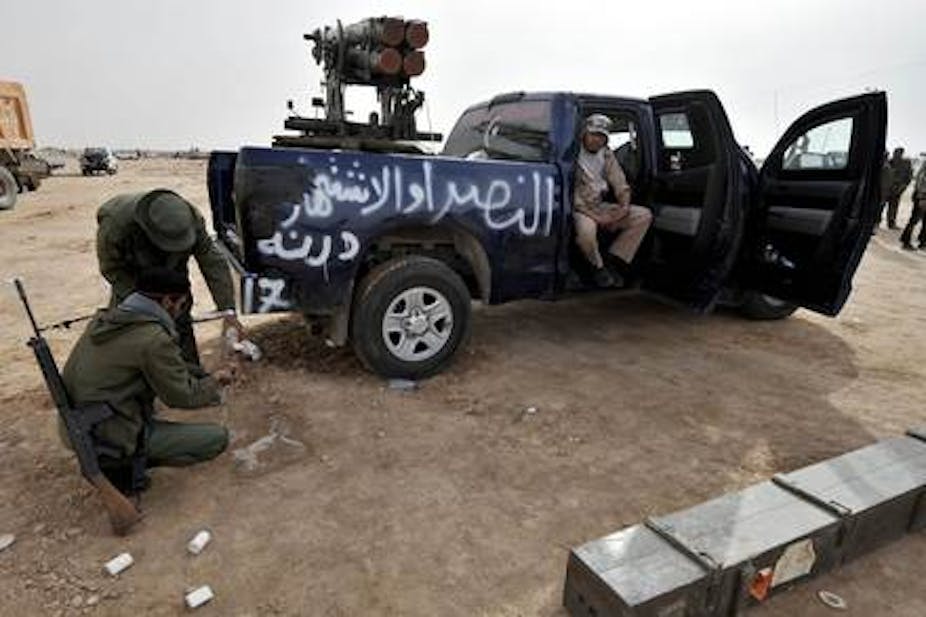A consistent theme of the media coverage following the rebel campaign in Libya is its disorganisation. The news footage shows gaggles of unkempt men remonstrating passionately with each other over what to do or who should be in charge.
Inevitably they dash off down the road in over-loaded vehicles, only to be met with ambush or artillery, and then come streaming back in a panicked retreat. There is no overall command or strategic plan, just a seemingly endless to and fro along the coast.
So why is this? How is it that with even all the airpower of the West on their side, the anti-Qaddafi forces are not able to get their act together and push the crumbling Libyan regime beyond the tipping point?
A good deal of the answer lies in a little green book and the confusing concept of Jamahiriya - a neologism coined by the eccentric Libyan dictator himself. This system effectively removes many of the traditional avenues for political opposition in Libya. This plus an extensive secret police network and a pliant military means that Qaddafi has emasculated his people’s ability to organise themselves or even trust each other.
In the Arab world, pressure on government usually comes from one or a combination of several channels: the military, the clergy, economic elites or political movements. But in Libya, all of these have been effectively throttled or subverted by Qaddafi. Doing away with even a Defence Ministry, the military is directly run by Qadaffi and his cronies. Regular purges mean that ambitious or problematic senior officers do not last long and only the tractable remain.
By cloaking himself in the trappings of Islam and Quranic law, the Colonel has usurped the role of the religious leaders, as well as having carried out a very effective eradication of radical Islam within Libya. Industry is nationalised so there are no economic stakeholders outside of the inner circle and political movements are banned.
Underlying all this is an Orwellian police state surveillance system that tends to deal with dissenters and free thinkers quickly and permanently. Colonel Qaddafi’s approach to police state tyranny goes beyond his attachment to Ruritanian uniforms or hours-long public addresses.
Reaching for the next level of prophethood, in 1975 the Colonel produced his magnum opus: the Green Book. Inside are the collected thoughts of the “Brother Leader” on everything from economic theory to the differences between the sexes.
Intended as a guide for all Libyans, the Green Book is chiefly notable for Qaddafi’s utopian ideal of how a state should run, which he eventually called his “Third International Theory”.
It is a model that blends Quranic ideals with a rejection of democracy, communism and capitalism and proffers a kind of unified Islamic national socialism based on self-reliance and self-governance.
At the core of this theory is the concept of devolving the functions of state to a series of popular peoples’ committees. Qadaffi dubbed this system of organisation as a ‘Jamahiriya’, meaning a state run by popular rule but forgoing the redundant tools of political parties or politicians.
What this means in practice is that below Qaddafi and his Revolutionary Command Council, any organisation and authority is farmed out to a exceedingly complex hierarchy of People’s Congresses and Committees operating from neighbourhood level upwards.
Members at the lowest levels elect their representatives to the next tier and so on up the pyramid. However appointments at the higher levels must be approved by the Revolutionary Command Council, which has an absolute veto power. Moreover, candidates are always individuals: political parties or platforms are illegal under the Jamahiriya system.
The result of this devolution is that below Qadaffi, any form of political identity or rallying point is erased. People in one local area will have no connection to those in another, since their elected representatives will have nothing in common beyond membership of one of the many People’s Congresses.
There are no parties or personalities to rally behind. The compartmentalisation of these small “electorates” and the understandable paranoia about spies is being played out in the rebel campaign, with anyone stepping up to take leadership being inherently distrusted on the basis of not being recognised or suspected of being an agent provocateur.
This then is the reason for the shambolic state of the rebel movement. In a country where any form of organisation has been suppressed for 40 years, it is not surprising that in the heat of battle consensus is hard to find.
The danger for the West is that more well-disciplined actors, such as al-Qaeda, will start to step in and stiffen the ranks, coalescing the opposition and leading to the ironic situation of NATO airstrikes supporting radical Islam.

